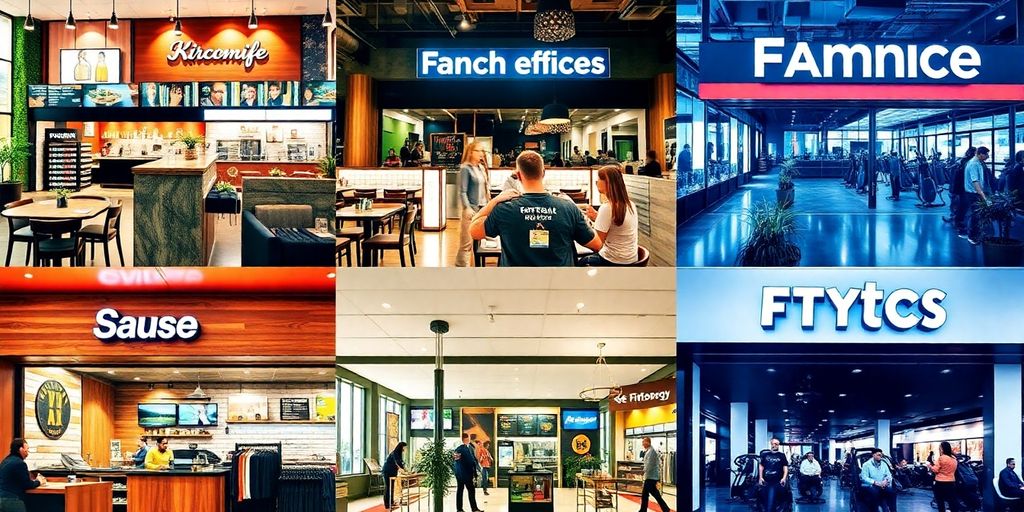Cele mai noi tendințe în industria francizelor

Franchising has become a dynamic field, constantly evolving to meet the demands of modern consumers and entrepreneurs. From sustainable practices to technological advancements, franchises are exploring new ways to stay relevant and competitive. In this article, we’ll dive into the latest trends shaping the industry, offering insights into where franchising is headed.
Key Takeaways
- Sustainable franchises are focusing on eco-friendly operations and renewable energy solutions.
- Health and wellness franchises are gaining popularity with organic food and personalized fitness services.
- Technology is transforming the franchise landscape through e-commerce, automation, and digital tools.
- Cultural diversity is making its mark with global cuisine and themed restaurant franchises.
- Flexible and affordable franchise models are emerging to adapt to economic uncertainties.
Emerging Trends in Sustainable Franchises
Eco-Friendly Practices in Franchise Models
Franchises are increasingly prioritizing environmentally conscious methods across operations. Many are adopting reusable packaging, sourcing locally to cut down on carbon footprints, and even utilizing energy-efficient technologies in stores. Consumers now prefer businesses that actively care for the planet, making sustainability a key differentiator.
Some examples of eco-friendly initiatives include:
- Using biodegradable materials for packaging.
- Partnering with suppliers who follow sustainable practices.
- Implementing energy-saving measures, such as LED lighting and smart thermostats.
Social Responsibility as a Competitive Edge
Social responsibility isn’t just a buzzword anymore. Franchises are stepping up by supporting community projects, offering fair wages, and ensuring ethically sourced products. This not only builds a positive brand image but also attracts a loyal customer base who value these efforts.
Key areas where franchises are making a difference:
- Funding local education programs.
- Offering employment opportunities to underrepresented groups.
- Donating a percentage of profits to environmental causes.
Franchises that integrate social responsibility into their core values are not just surviving—they’re thriving in today’s market.
Renewable Energy and Recycling Initiatives
Adopting renewable energy is becoming a cornerstone for sustainable franchises. From installing solar panels on store rooftops to using wind energy for operations, these businesses are reducing their reliance on non-renewable resources. Recycling programs are also gaining traction, with some franchises even incentivizing customers to participate.
Here’s a quick look at some impactful renewable energy trends:
| Renewable Energy | Adoption Example |
|---|---|
| Solar Panels | Store rooftops and parking lots |
| Wind Energy | Powering franchise headquarters |
| Recycling Rewards | Discounts for returning used items |
These initiatives not only cut costs but also align with the growing consumer demand for green business practices. Franchises embracing these changes are setting themselves apart in a competitive market.
The Rise of Health and Wellness Franchises

Organic and Healthy Food Offerings
Health-conscious consumers are driving the demand for franchises that focus on organic and nutritious food. Many of these businesses offer freshly prepared meals using locally sourced ingredients, catering to the growing interest in sustainable eating habits. This trend is reshaping the food industry, making health-oriented franchises a lucrative opportunity.
- Meal delivery services specializing in organic dishes are gaining traction.
- Cafes and restaurants offering allergen-free and plant-based options are expanding rapidly.
- Franchises focused on juice bars and smoothie shops are also seeing a surge in popularity.
Innovative Fitness and Spa Concepts
The fitness and wellness sector is buzzing with new ideas that combine physical health with relaxation. From boutique gyms to specialized spa treatments, franchises are tapping into the desire for personalized and unique experiences.
- Boutique fitness studios, like Pilates or yoga centers, are taking off.
- Spa franchises are incorporating cutting-edge treatments, such as cryotherapy and floatation therapy.
- Hybrid models combining fitness and wellness, like gym-spa combos, are emerging as a strong trend.
Personalized Wellness Experiences
People are seeking more tailored approaches to their health and well-being. Franchises that offer customized plans are becoming increasingly appealing.
Personalized wellness is no longer a luxury but an expectation, as individuals look for solutions that fit their unique needs.
- Wellness centers offering DNA-based nutrition and fitness plans are on the rise.
- Mental health-focused franchises, including meditation and mindfulness studios, are carving out a niche.
- Tech-integrated wellness services, such as wearable devices paired with coaching, are becoming standard in this space.
For example, key trends in fitness and wellness for 2024 highlight the growing popularity of Pilates and strength-focused studios, which align with this broader movement toward health and wellness.
Technological Innovations Shaping Franchising
E-Commerce and Home Delivery Integration
The shift toward online shopping and delivery has completely transformed how franchises operate. Many businesses are now integrating robust e-commerce platforms to reach customers wherever they are. This has opened up new opportunities for franchises to expand their reach without needing physical stores in every location.
- Franchisees can manage online orders through centralized systems.
- Delivery services, often partnered with third-party apps, have become standard.
- Analytics tools help franchises predict customer preferences and optimize inventory.
Digital Platforms for Franchise Collaboration
Franchisors are increasingly using digital tools to ensure smooth communication and operations across their networks. These platforms allow franchise owners to share best practices, access training resources, and monitor performance metrics in real time.
- Cloud-based systems for document sharing.
- Online dashboards for tracking sales and marketing campaigns.
- Virtual training sessions to onboard new franchisees efficiently.
Digital platforms are not just about convenience—they’re becoming a necessity for franchises to remain competitive in a tech-driven world.
Automation in Customer Service
Automation tools, like chatbots and self-service kiosks, are making customer interactions quicker and more efficient. Franchises are leveraging these technologies to reduce operational costs while improving customer satisfaction.
| Technology | Benefit | Example Use Case |
|---|---|---|
| Chatbots | 24/7 customer support | Answering FAQs |
| Self-service kiosks | Faster checkout times | Ordering at fast-food chains |
| AI recommendations | Personalized shopping experiences | Suggesting menu items |
Franchises that embrace these tools are finding that they can serve more customers while maintaining high-quality interactions. AI, e-commerce, and digital tools are clearly leading the way in reshaping the franchising landscape.
Cultural and Culinary Diversity in Franchises
Global Cuisine Concepts Gaining Popularity
Franchises centered around global cuisines are making waves. People love exploring new flavors without leaving their hometowns. Asian concepts like sushi bars and noodle houses, Mediterranean tapas, and South American taco chains are hitting the sweet spot. For instance, tacos and nachos from brands like Tacos Avenue and Nachos Mexican Grill are not just food—they’re experiences. These franchises are thriving because they bring authentic tastes and a slice of culture to the table.
Themed Restaurants and Unique Dining Experiences
Themed restaurants are another big draw. Diners want more than just a meal; they want an experience. Think pirate-themed seafood joints or retro 1950s diners. These concepts keep customers coming back because they offer something out of the ordinary. Plus, they’re Instagram-friendly, which helps spread the word. Franchises with well-executed themes often see higher customer retention and word-of-mouth referrals.
Regional Specialties as Franchise Opportunities
Local flavors are also getting their moment in the spotlight. From New Orleans-style gumbo to Italian gelato, franchises are capitalizing on regional specialties. These businesses not only celebrate local culture but also create jobs and stimulate local economies. Restaurant franchises are a great example—they’re boosting community engagement while offering something unique. It’s a win-win for everyone involved.
Franchises are no longer just about selling products—they’re about sharing stories, traditions, and cultures through food.
Adapting to Economic and Social Changes
Flexible Franchise Models for Remote Work
The shift toward remote work has pushed franchises to rethink their operational models. Some are adopting hybrid systems where franchisees can manage operations online, reducing the need for physical locations. This not only cuts costs but also makes franchises more accessible to a broader audience. For instance, digital platforms now allow franchisees to collaborate and share resources from anywhere, creating a seamless experience.
Affordable Investment Opportunities
Economic uncertainty has led to a demand for franchises with lower startup costs. Affordable franchises are becoming the go-to choice for entrepreneurs looking to minimize risk while entering the market. Many emerging franchises now offer scalable investment options, allowing new owners to start small and expand as their business grows. This approach is particularly appealing in regions where economic recovery is gradual.
Resilience in Uncertain Economic Times
Franchises have shown remarkable resilience during economic downturns. Their ability to adapt quickly—whether by adopting technology, offering new services, or adjusting pricing strategies—has set them apart. A key strategy includes diversifying revenue streams, such as incorporating e-commerce or delivery services, to ensure stability even when traditional sales channels falter.
Franchises thrive by staying agile, proving that adaptability is the cornerstone of success in challenging times.
| Key Adaptation Strategies | Benefits |
|---|---|
| Hybrid work models | Lower costs, wider reach |
| Scalable investments | Lower risk, gradual expansion |
| Revenue diversification | Stability in crises |
Starting a franchise in 2025 could be a wise move, as the industry continues to innovate and grow despite economic challenges. Franchise opportunities today are designed to be more resilient and flexible, making them an attractive option for aspiring entrepreneurs.
Franchising in the Real Estate and Home Improvement Sectors
Trends in Sustainable Construction
Sustainable construction is gaining serious traction in franchising. With stricter energy regulations and a growing focus on renewable energy, franchises in this sector are adapting fast. Franchises offering eco-friendly renovation services are becoming highly attractive to homeowners. These services often include energy-saving solutions like better insulation, solar panel installations, and water-saving systems.
- Key trends driving this growth:
- Adoption of green building materials.
- Increased demand for energy-efficient renovations.
- Government incentives for eco-friendly home improvements.
Home Automation and Smart Living
Smart home technology isn’t just for tech enthusiasts anymore—it’s mainstream. Franchises specializing in home automation are tapping into this trend, offering systems that control lighting, heating, and even security remotely. Imagine being able to lock your doors or adjust your thermostat with just a smartphone app. That’s the kind of convenience people are willing to pay for.
Some popular services in this space include:
- Smart lighting and energy management systems.
- Home security setups with real-time monitoring.
- Voice-controlled home assistants.
Interior Design and Furniture Franchises
Interior design and furniture franchises are also making waves. These businesses cater to consumers looking for stylish yet functional living spaces. From modular furniture to custom cabinetry, the focus is on personalization. Many of these franchises also emphasize sustainable materials, aligning with broader market trends.
"The home improvement sector is a goldmine for entrepreneurs, especially with the rising interest in sustainable and smart living solutions."
For those looking to invest, the senior care franchise market is another area seeing growing demand, driven by an aging population and their unique housing needs.
The Role of Franchise Expos in Industry Growth

Showcasing Innovative Franchise Concepts
Franchise expos are like a treasure chest for entrepreneurs. They bring together a mix of fresh ideas and proven business models under one roof. These events are where the next big franchise concepts often make their debut. Whether it’s a revolutionary food truck idea or a high-tech fitness franchise, expos are the stage where brands showcase their potential to attract investors and partners. Attendees get a firsthand look at the latest trends, making it easier to identify opportunities that align with their goals.
Networking Opportunities for Entrepreneurs
For anyone serious about franchising, expos are golden opportunities to meet the right people. Imagine walking into a space filled with franchise owners, industry experts, and potential investors—all eager to connect. Here are some ways these interactions can help:
- Gain insights from seasoned franchisees and franchisors.
- Build relationships with consultants and advisors who specialize in franchising.
- Discover funding options directly from financial institutions present at the expo.
These connections often lead to partnerships that wouldn’t happen otherwise. It’s not just about business cards; it’s about meaningful conversations.
Insights from Industry Leaders
One of the biggest draws of franchise expos is the chance to learn from the best in the business. Many events feature panels, workshops, and keynote speeches by industry veterans. These sessions cover everything from market trends to operational challenges. For example, a panel discussion might focus on how to adapt franchise models for emerging markets or how to leverage technology for growth. The insights gained here can be game-changing for both new and experienced entrepreneurs.
Franchise expos are more than just events; they’re platforms for innovation, learning, and growth. They provide a comprehensive view of the franchising landscape, helping attendees make informed decisions about their next steps in the industry.
Franchise exhibitions play a pivotal role in shaping the future of franchising, making them indispensable for anyone looking to thrive in this dynamic field.
Conclusion
The franchise industry is evolving rapidly, with new trends shaping the way businesses operate and grow. From eco-friendly concepts to innovative food offerings and digital-first models, there’s no shortage of opportunities for entrepreneurs. Whether you’re drawn to the booming health and wellness sector, the ever-popular fast food chains, or niche markets like electric bikes, the possibilities are vast. As the market continues to adapt to consumer demands and global challenges, staying informed and flexible will be key for anyone looking to dive into franchising. It’s an exciting time to explore this dynamic world and find the right fit for your ambitions.
Frequently Asked Questions
What are some examples of eco-friendly practices in franchises?
Many franchises are adopting sustainable methods such as using renewable energy, reducing waste through recycling programs, and offering products made from recycled materials. These efforts help protect the environment and appeal to eco-conscious customers.
Why is social responsibility important for franchises?
Social responsibility helps franchises build trust and loyalty with customers. By supporting community projects or ethical practices, franchises show they care about more than just profits, making them stand out in the market.
What trends are shaping the health and wellness franchise sector?
Health and wellness franchises are focusing on organic food, personalized fitness plans, and innovative spa treatments. These trends cater to people who prioritize a healthy lifestyle and seek unique wellness experiences.
How is technology changing the franchising industry?
Technology is driving changes like e-commerce integration, digital platforms for collaboration, and automated customer service. These innovations make franchises more efficient and adaptable to modern consumer needs.
What makes cultural diversity important in culinary franchises?
Cultural diversity introduces customers to global cuisines and unique dining experiences. Franchises that highlight regional specialties or themed concepts often attract a wider audience.
How do franchise expos benefit entrepreneurs?
Franchise expos showcase innovative business ideas, provide networking opportunities, and offer insights from industry leaders. They are a great way for entrepreneurs to explore potential investments and learn about market trends.













